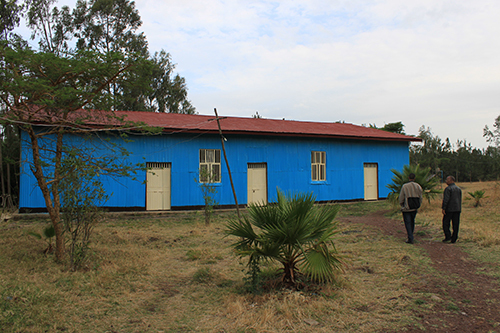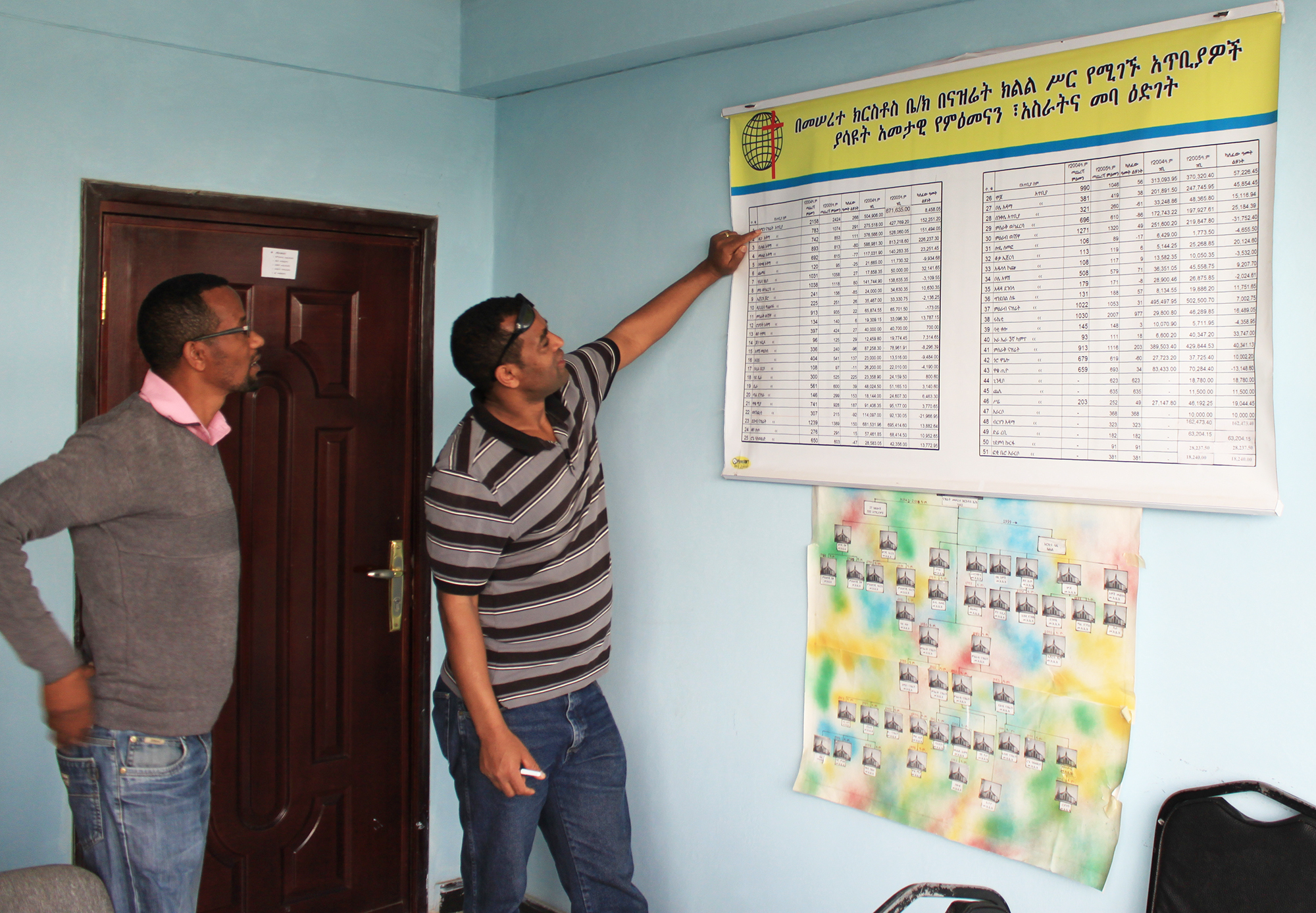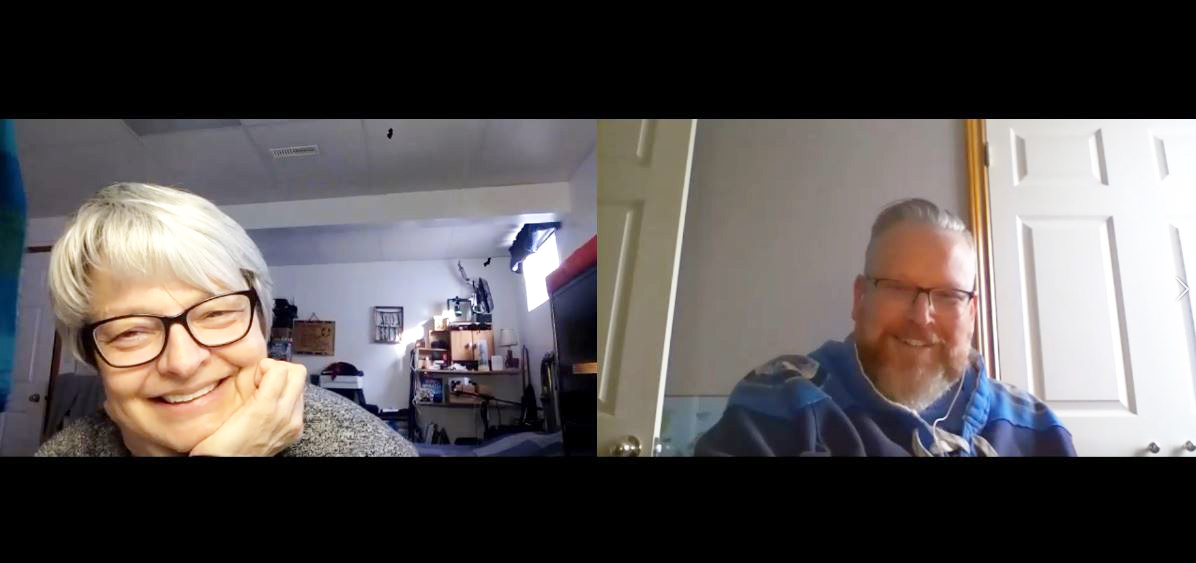A life-altering gospel and simple faith
How leaders are nurtured in Ethiopia’s rapidly growing Mennonite church
March 10th, 2021
BY KATIE DOKE SAWATZKY


A church-planting map of Nazret Regional Church in Ethiopia
Jeanette Hanson (Director of International Witness) and Norm Dyck (MCEC Mission Minister).
Over Zoom, Norm Dyck screen shares a photo of a church-planting map from in the Nazareth-Adama region of Ethiopia. At the top is the mother church established in 1948 with the help of Mennonite mission workers.
In the style of a genealogical tree, but going from top to bottom, the map shows a total of 46 churches birthed from the mother church. What started as a small, missionary movement has grown exponentially.
“Each regional church has a map like this,” says Dyck, who is Mennonite Church Eastern Canada’s mission minister and seconded part-time for Mennonite Church Canada International Witness. “Even individual congregations have maps like this.”
Today, Meserete Kristos Church has over 647,000 members, 1135 local churches and 1,112 church-planting centres, which are growing congregations supported by a mother church. Twenty-seven thousand people were baptized in 2019 alone.

The church building for the Wooliso congregation. (Photo source: Norm Dyck.)
For believers in Canada, this growth is staggering. But for those a part of MKC, the church growth is intimately tied to the church’s history of persecution and the methods it took to survive. Out of these practices developed a robust process for nurturing leaders, who were encouraged to plant churches in their own neighbourhoods and whose gifts were discerned by communities of believers.
Persecution happens to this day in some regions but the darkest time was during the Derg from 1974 to 1987, when the military overthrew the government and established communist rule.
“That’s when discipleship really kicked into high gear,” says Dyck.
The MKC went underground, meeting in secret in houses and fields. Women carried Bibles in the folds of their clothing because they were less likely to be searched. Once a group gathered more than 12 households it split up to avoid attention. During this time, the membership increased tenfold.

Fanosie Legesse (right) pointing to information about Nazret regional church.
A simple faith
Fanosie Legesse, Intercultural Mission Minister for MCEC, grew up in Ethiopia during the communist rule. Groomed to be a communist leader as a teenager, he joined MKC when he was 17.
“As soon as I became a follower of Jesus Christ, it made sense,” says Legesse. “It made sense to give everything up and follow him to wherever he led me.”
Legesse describes his rural Ethiopia as a place without electricity, roads or telephones. For him, the gospel was “literally, a light.” He made a personal commitment to take that light to the surrounding villages and says his story is a sample of what many women and men chose to do during the darkest time of persecution.
'It made sense to give everything up and follow him to wherever he led me.'
Legesse became a leader in his local church in Sire, Ethiopia, in the early 1990s, and went on to study at Meserete Kristos College in Debre Zeit-Bishoftu. He came to Canada in 2003 and returned to Ethiopia with his family as Witness workers from 2007 to 2010. He pastored Zion Mennonite Fellowship in Elmira, Ont., from 2015 to 2019 and now serves MCEC.
Dyck, who visited Ethiopia for the first time in 2015, was struck by the expectations MKC has for new believers. They are assigned a mentor right away and attend prayer meetings and Bible studies every week for at least two years. The connection with their church family is constant until they mature. It reminded him of the catechumenal process of the early church.
“There’s a high level of accountability early on in your faith journey,” said Dyck. “It becomes part of the fabric of everything that you do,” he says.
Legesse highlights the key components of MKC’s leadership development—communal discernment of individuals’ gifts, mentorship by mature believers, regular prayer meetings. But then he takes a moment to mention how even the term “leadership development” seems like a Western complication of something that at the time was necessary for survival.
“It was simple, not complicated,” he says. “It was a literal interpretation of the Bible until you hit the wall. Then you would say, ‘I may have made a mistake,’ or you pray or fast about it. You ask forgiveness and correct and continue.”
For Jeanette Hanson, director of International Witness for Mennonite Church Canada, what is inspiring about MKC leadership development is that simplicity.
“It really comes from a very grassroots level of discipleship,” she says.
'It was simple, not complicated. It was a literal interpretation of the Bible until you hit the wall. Then you would say, 'I may have made a mistake,’ or you pray or fast about it. You ask forgiveness and correct and continue.'
How does this speak to us?
Mennonite Church Canada has a sister-church relationship with MKC. Both churches commit to pray for each other, encourage and learn from each other and share resources in mission: prayer, personnel, teaching and finances.
Current financial support provides scholarships for students and short-term teachers at Meserete Kristos College (seminary). MKC church leaders come to the seminary after they receive training from their local and regional churches, some of which have their own colleges. The local church pays for leaders to study at these colleges and supports the family of the leader while he or she is away studying.
In terms of what congregations here in Canada can learn from MKC, Dyck says for him it’s a realization that the gospel is life-altering and transformative.
“That’s the challenge I keep coming back to in my personal journey,” he says. “I don’t experience that power of transformation within my own faith journey.”
He attributes that to the fact that in Canada there are systems in place that (at least attempt to) alleviate the realities Ethiopians still face: poverty, inadequate healthcare, religious persecution.
“In Ethiopia, that’s the church,” he says.
MKC’s February newsletter highlights the church’s prison and peacebuilding ministries, which are examples, Dyck says, of the church’s ongoing discipleship in the name of Christ. Transformation is what you witness when you encounter the global church, he says.
To donate to Meserete Kristos Church and Meserete Kristos College, please visit: mennonitechurch.ca/giving.
Media contacts:
